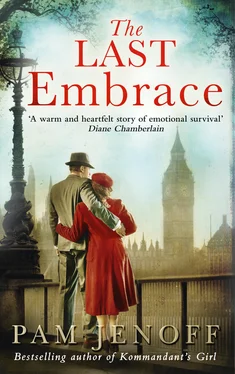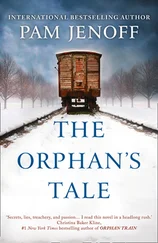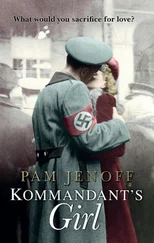Praise for
Pam Jenoff
‘This love story will melt you.’
—Company magazine on The Ambassador’s Daughter
‘This is historical romance at its finest.’
—Publishers Weekly on Kommandant’s Girl
‘In her moving first novel, Jenoff offers an insightful portrait of people forced into an untenable situation and succeeds in humanising the unfathomable as well as the heroic.’
—Booklist on Kommandant’s Girl
‘Poignant and intense’
—Good Book Guide on The Diplomat’s Wife
‘Jenoff explores the immediate aftermath of World War II with sensitivity and compassion, shedding light on an often overlooked era of European history. She expertly draws out the tension and illustrates the danger and poverty of Eastern Europe as it falls under communism. Highly recommended for all fiction collections.’
—Library Journal on The Diplomat’s Wife
‘… well constructed and a real page-turner’
—Birmingham Jewish Weekly on The Diplomat’s Wife
PAM JENOFFis the author of several novels, including the international bestseller Kommandant’s Girl , which also earned her a Quill Award nomination. Along with a bachelor degree in International Affairs from George Washington University and a master’s degree in History from Cambridge, she received her Juris Doctor from the University of Pennsylvania and previously served as a Foreign Service Officer for the US State Department in Europe, as the Special Assistant to the Secretary of the Army at the Pentagon and as a practising attorney. Pam lives with her husband and three children near Philadelphia where, in addition to writing, she teaches law school.
Visit Pam at www.pamjenoff.com
The Last Embrace
Pam Jenoff

For my own brother, Jay
Contents
Cover
Praise
About the Author
Title Page
Dedication
PROLOGUE
PART ONE
ONE
TWO
THREE
FOUR
FIVE
SIX
SEVEN
EIGHT
NINE
PART TWO
TEN
ELEVEN
TWELVE
THIRTEEN
FOURTEEN
FIFTEEN
SIXTEEN
SEVENTEEN
EIGHTEEN
NINETEEN
TWENTY
TWENTY-ONE
TWENTY-TWO
PART THREE
TWENTY-THREE
TWENTY-FOUR
TWENTY-FIVE
TWENTY-SIX
TWENTY-SEVEN
TWENTY-EIGHT
EPILOGUE
ACKNOWLEDGMENTS
Reader’s Guide for The Last Embrace
QUESTIONS FOR DISCUSSION
Endpages
Copyright

New Jersey August 1944
I sense home before I can see it. Five miles out, the wet salt air enters my mouth and fills my lungs, and the cries of the gulls rise harshly to meet me. But it isn’t until I round the final curve and the wide expanse of murky brown water springs into view that the lump in my chest grows and my eyes begin to burn.
“Damn you,” I say aloud as I pull to the side of the road. “God damn you to hell.”
Absecon Bay remains unmoved. Its calmness seems hypocrisy.
I shift Uncle Meyer’s Buick into gear once more; the engine revs weakly. It is midafternoon and the sun glistens high above the water, the air late-summer warm. The smell of fresh lemon polish rises from the dashboard, mingling with the sea air and lingering cigar smoke. A station wagon passes in the opposite direction, laden with beach chairs and a barbecue grill. Despite the war, some things have not changed: the flight of the summer renters, dusting the sand off their sticky-fingered children and returning to normal life as Labor Day nears, is still the earliest sign of fall. Along the Black Horse Pike on my way down the shore, the prices of peaches and cherries and other summer produce, plentiful even while other food is in short supply, have been slashed, preparing to give way to apples and gourds. Hand-painted signs tout end-of-season corn. Some of the drive-up stands that did a brisk business in hot dogs and root-beer floats all season have already closed.
I pull onto the road, passing signs that exhort me to watch the coast vigilantly for German ships and to buy war bonds. As I guide the car along the edge of the bay, high sea reeds rise from the marshes, obscuring my view of the water. Exhaling, I focus on the casual tangle of shops ahead. Everything had seemed so much bigger in my mind’s eye. Now the houses, with their blackout curtains and flags, are miniature, like the ones Uncle Meyer built alongside his model railroad. The whole place could use a good coat of paint.
I begin to climb the gentle arc of the bridge. A narrow strip of water lined with docks and small boats comes into view. I startle, accidentally slamming on the brake and scarcely hearing the car horn that blares behind me.
I wipe my damp palms against my cotton skirt, which has become wrinkled during the drive. Then I press my foot against the accelerator and continue south, clenching the steering wheel, knuckles white. “Knock it off,” I mutter aloud through gritted teeth, “or you’ll never make it.” Which, as I think about it, does not seem like a half-bad idea.
Just before the Esso station marked with rationing notices, I take a right turn and then another. Then I turn left onto Sunset Avenue. The block which holds such weight in my memories is nothing more than a half dozen or so houses parallel to the bay, built decades earlier, their clapboard fronts scarred, like the lined face of an old woman, from the storms they have weathered. As I drive past each house, I rattle off mentally the people who had lived there: at the fourth house, kindly Mrs. Henderson, known as Aunt Molly to the kids, Joe and Louise Steiner at the fifth. Many of the neighbors are undoubtedly the same—except for the sixth house, which has been vacant since the day the Connallys drove out of my life forever.
I stare straight ahead, trying to focus on the road. But it is no use—even in broad daylight, I see the nightmare that I have lived so many times in my sleep: I am standing on a narrow, deserted strip of the boardwalk, looking out at the vast green-gray ocean. I watch as the tide comes in and the water level grows continually higher. A black wave rises like an enormous hand to twenty feet or more. The wall of water crashes down from above, knocking me to the ground and enveloping me completely. I fight, unable to stand or breathe, as the water fills my lungs and swallows me whole.
Suddenly my vision clears, the image gone as quickly as it came. I tell myself that it isn’t real, that the past will not return. Why be afraid when there is nothing left to lose? But it is no use.
My nightmares have returned again, the surest sign that I am home.


Washington, DC November 1943
I did not fight the umbrella which blew inside out as I stepped from the streetcar. Instead, I clung tighter to my nearly soaked cloche to hold it in place against the icy rain that slanted sideways across Pennsylvania Avenue. Navigating the slick pavement carefully, I swam through the midafternoon crowd, mostly women and a few men too old or broken for service, who were waiting in line at the Red Cross canteen truck for coffee, or making their way between government buildings and the makeshift tent offices that lined the Mall.
Читать дальше
















